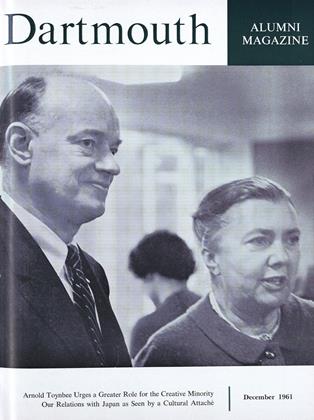By Gene M. Lyons. Columbus: OhioState University Press, 1961. 298 pp.$4.50.
Americans began to plan the reconstruction of Korea almost as soon as the first shell exploded on that unhappy peninsula in 1950. But instead of doing the job alone we initiated an international agency to do it. This was the United Nations Reconstruction Agency.
In this book Professor Lyons tells the story of UNKRA with an ease derived from an insider's knowledge of issues and a mastery of relevant documents.
UNKRA was clearly part of a larger American effort to induce other countries to share our Korean responsibilities, or at least to pretend that they shared them. To the State Department it was also something grander, nothing less than a pilot project for a larger program of international economic aid to Asia and Latin America. Of course, other UN members expected Uncle Sam to pick up most of the check for UNKRA's activities, and Congress in turn expected UNKRA to be directed by an American national responsive to American policy.
Everybody's desires might have been realized if the enemy and our own military leaders ]could have been brought in on the plan. But the communists, by refusing to surrender, withheld from UNKRA the definite date on which its reconstruction program could safely be launched. Without such a date our Army was not burning to permit internationally employed civilians to mess around the battlefield with resources deemed essential to the security of their combat forces. Inevitably, the military command tried to define UNKRA's jurisdiction as narrowly as possible, and its own responsibilities for emergency relief as broadly as possible.
Since the Army had physical control of transport and other facilities in the theater of war, nothing could have saved UNKRA at this juncture except vigorous intervention by the State Department on behalf of its original political goals. This was not forthcoming. UNKRA languished. Other nations, losing interest, withheld even the small sums they were asked to give the agency. The last straw was added when UNKRA's modest reconstruction plans were subordinated to a large and purely American program of military aid to South Korea. All hands now agreed to let UNKRA wither away.
Throughout his closely reasoned analysis of this episode, Professor Lyons emphasizes the interaction of force and diplomacy, the contrasting perspectives of the State and Defense Departments, and the closely connected but not quite identical issues of civil-military relations. The result is rich fare.
 View Full Issue
View Full Issue
More From This Issue
-
 Feature
FeatureCULTURAL CATALYSIS
December 1961 By DONALD BARTLETT '24 -
 Feature
FeatureHas America Neglected Her Creative Minority?
December 1961 -
 Feature
Feature30,000 Dartmouth Men Are Her Friendsand Problems
December 1961 By CLIFFORD L. JORDAN '45 -
 Feature
Feature"AN OUTSTANDING FOUNDATION UPON WHICH TO BUILD"
December 1961 -
 Class Notes
Class Notes1956
December 1961 By STEWART SANDERS, JAMES L. FLYNN -
 Class Notes
Class Notes1930
December 1961 By WALLACE BLAKEY, HENRY S. EMBREE, JOHN F. RICH
Books
-
 Books
BooksFACULTY PUBLICATIONS
March 1920 -
 Books
BooksAlumni Articles
MARCH 1966 -
 Books
BooksTHE AUTOBIOGRAPHY OF EDWARD GIBBON.
July 1961 By HAROLD L. BOND '42 -
 Books
BooksTHE STORY OF AMERICAN DISSENT.
November 1934 By Malcolm Keir -
 Books
BooksLIQUIDITY AND STABILITY
January 1941 By Ray V. Leffler -
 Books
BooksDAS DEUTSSCHE DRAMA IM AMERI KANISCHEN COLLEGE-U. UNIVERSITAETS—THEATER
May 1938 By Royal C. Nemiah


